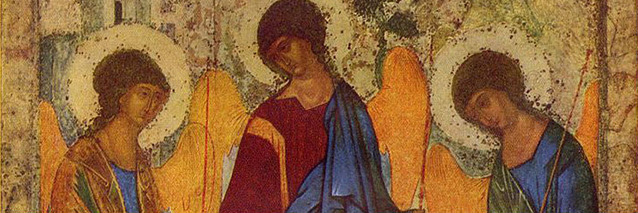"Jesus' foundational and even dualistic bias is against false power and in favor of the powerless."
Richard Rohr's Daily Meditation

"Fathers of the Eastern Church"
"Responding to Vengeful Scriptures"
Friday, 15 May 2015
As we explored yesterday, hell is not what we've pictured it to be but simply a much-needed metaphor (found in most religions) for the ultimate tragedy of not choosing life and love. If all will be saved by the unconditional victory of God, then why does Jesus tell stories that show harsh judgment, casting the rejected into "outer darkness" and "eternal punishment," in places like Matthew 25:46? Ending an important parable with this final damning line seems to undo all the mercy and forgiveness Jesus demonstrates throughout the rest of his life and teaching. Let me explain how I see it.
Clear-headed dualistic thinking must precede any further movement into non-dual or mystical consciousness, especially about issues that people want to avoid, as in this case. Note that Jesus reserves his most damning and dualistic statements for issues of social justice where humanity and power is most resistant: "You cannot serve both God and Mammon" (Matthew 6:24); "It is easier for a camel to go through the eye of a needle, than for a rich man to enter the kingdom of God" (Matthew 19:24); or the dichotomy in Matthew 25 between sheep (who feed the hungry, welcome the stranger, clothe the naked, care for the sick, and visit the imprisoned) and goats (who don't). The context is important. Jesus' foundational and even dualistic bias is against false power and in favor of the powerless--and yet it still has had very little effect in Christian history. If you do not make such points absolutely clear (and even if you do, as Jesus did), history shows that humans will almost always compromise on issues of justice, money, and inclusion. Let's bring it home: the United States always has all the money it needs for war, armaments, and military bases, but never enough for good schools, low cost housing, universal health care, or the humane care of immigrants. No wonder Jesus dared to be dualistic and damning first! Our capacity for blindness here seems infinite.
But the problem with such dualistic statements is that any call to change is aimed at the lowest level of motivation--threat and fear--even vengeful and eternal threats. This does not create loving people, but fearful people, which is an entirely different game. The New Testament passages about Gehenna (Jerusalem's smoldering dump), Sheol (the place of the dead, with no intimation of punishment), and "eternal punishment" are mostly found in Matthew and seem to be his way of making dramatic and contrasting statements about issues of ultimate significance, which does call the reader to choice and decision. The trouble is that the threat in the last line becomes the lasting memory and message instead of the primary invitation and promise of the whole previous text. The real message of the parable is a call to a transformed mind and heart. Matthew, as an effective communicator, dramatically contrasts eternal life with eternal death and surely had no idea that we'd take it so literally, morphing his words into the medieval notion of God as an eternal torturer. This view is clearly anti-Gospel. Even the conservative Pope John Paul II said that heaven and hell were not geographical places, but primarily states of consciousness--which are in themselves very real and lasting.[1]
Perhaps upon reading passages such as Matthew 25 or the vengeful Psalms calling for God's wrath, we might do well to follow the Eastern Orthodox Saint Silouan's advice [2]:
"I remember a conversation between [Staretz Silouan] and a certain hermit, who declared with evident satisfaction, 'God will punish all atheists. They will burn in everlasting fire.'
"Obviously upset, the Staretz said, 'Tell me, supposing you went to paradise, and there looked down and saw somebody burning in hell-fire--would you feel happy?'
"'It can't be helped. It would be their own fault,' said the hermit.
"The Staretz answered him with a sorrowful countenance:
"'Love could not bear that,' he said. 'We must pray for all.'"
Gateway to Silence: We are one.
References:
[1] Pope John Paul II, General Audience (June 28, 1999).
[2] Bishop Kallistos Ware, The Inner Kingdom, Vol. 1 of the Collected Works (St. Vladimir's Seminary Press: 2004), 48.

Center for Action and Contemplation
cac.org
Center for Action and Contemplation
1823 Five Points Road SW (physical)
PO Box 12464 (mailing)
Albuquerque, New Mexico 87195 United States
____________________________
____________________________





No comments:
Post a Comment